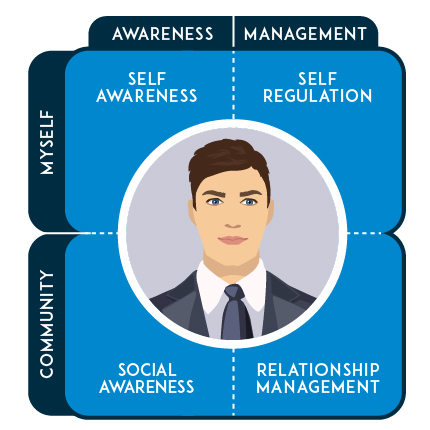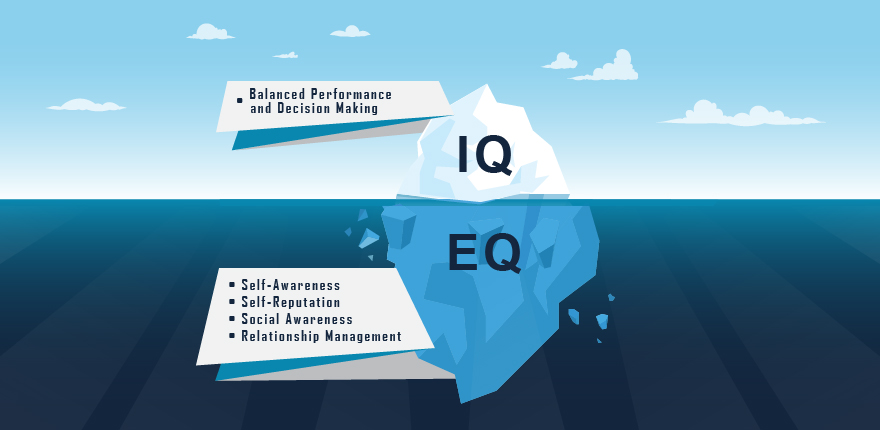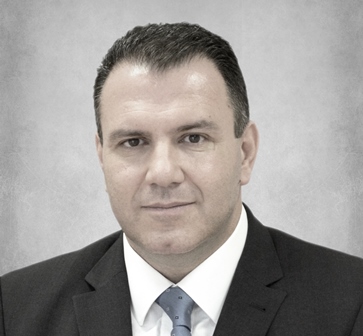In today’s corporate life, dependent on negotiation, compromise, and collaboration, the importance of emotional intelligence (EQ) should not be understated. We hear that many organizations now use EQ testing in order to hire new staff. But, what’s more important in determining life success? Our ability to learn and apply knowledge – cognitive intelligence (IQ) – or emotional intelligence (EQ)?
What is Emotional Intelligence?
Emotional intelligence is also known as emotional quotient (EQ) and emotional intelligence quotient (EIQ). It can be defined as the ability to monitor one’s own and other people’s emotions, to discriminate between different emotions and label them appropriately, and to use emotional information to guide thinking and behavior. Emotional intelligence also reflects abilities to join intelligence, empathy and emotions to enhance thought and understanding of interpersonal dynamics.
According to Harvard Business Review, emotional intelligence (EQ) is
“the key attribute that distinguishes outstanding performers,”
and is the leading differentiator between employees whose IQ and technical skills are approximately the same.

Both ourselves and the community can be defined as the main components of emotional intelligence. Specifically, our self-competence includes
- the ability to accurately perceive our emotions and stay aware of them as they happen; the so-called Self-Awareness ability and
- Self-Management; our ability to use the aforesaid self-awareness in order to stay flexible and positively direct your behavior.
On the other side, social competence is made up of our social awareness and relationship management skills;
- Social Awareness is our ability to accurately pick up on emotions in other people. In other words, it is the ability to understand and respond to the needs of others.
- Relationship Management is our ability to use both self-awareness and social awareness in order to manage interactions successfully.
Just as at the iceberg of success, so at the iceberg of intelligence, the IQ is just the tip of the Iceberg; the visible part of it, which we all know is just the small upper tip of it. The larger, underwater part represents our EQ.

There is no doubt that a person who is more responsive emotionally to crucial issues will attend to the more crucial aspects of his or her life. Have you ever wondered to what extend do you recognize your emotions, understand what they’re telling you, and realize how your emotions affect people around you? Many EQ tests provide Emotional Intelligence measurement. However, they vary in terms of the capacities they target. The Harvard Business Review Quiz, for instance, helps you gain a deeper understanding of your own emotional intelligence. Actually, there are six major signs of emotional intelligence:
6 Signs that you are Emotional Intelligent
1. You are Self-Aware
For most people, self-awareness is the most important part of EQ. Indeed, people with high emotional intelligence are usually very self-aware; meaning that they have the ability to recognize emotions (and their impact) in both themselves and others. They know their strengths and weaknesses as well.
2. You demonstrate empathy
Did you know that showing empathy avoids stereotyping and judging too quickly? Empathy is the ability to understand others’ thoughts and feelings while also helps you connect with others. People who demonstrate empathy are good listeners and are proved to build deeper, more connected relationships as they work hard to see things through others’ eyes.
3. You self-regulate
Self-Regulation is the ability to control emotions but also impulses. People who self-regulate are not afraid of saying no and tend to think wisely before they act. For instance, highly emotionally intelligent people don’t get easily flustered when things don’t go according to plan. In particular, they barely become angry or jealous; they neither make impulsive, careless decisions.
4. You are motivated
People with emotional intelligence defer immediate results for long-term success. They’re highly productive, love a challenge, and are very effective in whatever they do.
5. You are socially aware
Being socially aware means understanding other people’s moods, behavior, and motives in order to improve the quality of your relationships. In fact, the net result of social awareness is the ongoing development of social skills explained below.
6. You are social skilled
Social skills are arguably the most important set of abilities someone can have. Having great social skills help you meet interesting people or get the job you want.
Social skills are like any other skill. If you practice, you’ll get better. You don’t need to be born with natural charisma, and it’s never too late to learn. Therefore, emotional intelligence can be learned. Actually, it’s a lifetime process! At the other end of the spectrum personality traits are prominent aspects of character that are exhibited in a wide range of important social and personal contexts. Personality is seen as the essence of character. It is part of an individual´s genetic makeup and is stable over time.
How to boost your emotional intelligence
It is more than obvious that in order to develop our emotional intelligence, we need to develop the aforesaid personal and social skills in terms of both awareness and management.
- Become more self-aware
Work on how well you know yourself, your thoughts or your feelings? Self-awareness is the foundation of personal growth and success. Daniel Goleman calls it the ‘keystone’ of emotional intelligence.
It is the kind attention we pay to our thoughts and feelings that makes it impossible for our emotions to rule us. Recognizing and understanding our emotions means having the power to control them.
- Develop your self-regulation ability
Take a time out of your busy day-to-day activities; stop and reflect on what brings you the greatest meaning in your life. If we fail to do this on a regular basis, we risk becoming tranquilized by the trivial; sedated by the small details. It is important for one to have the knowledge, skills and support structure to develop resilience and to effectively self-manage stress on a daily basis.
- Understand and respond to the needs of others
After having payed attention to yourself, it is time to see how yourself interacts with others. Understanding and responding to the needs of others means being social aware and being socially aware is a natural response to people. Taking others situation and needs into account as much as possible!
- Create strong bonds
Work on your relationships management. It is not enough to be friendly. Most of the competencies of relationship management are associated with leadership. You should connect with others in ways that help them feel understood. Furthermore, effectively communicate the need for change and demonstrate support for the process.
Why emotional intelligence matters
Nowadays EQ is an important job skill, it helps get the right people in the right place. EQ separates good performers in the workplace from the great ones. It affects how we manage behavior, navigate social complexities, and make personal decisions that achieve positive results. Therefore, people with strong emotional intelligence are more likely to succeed than those with high IQs or relevant experience.
“Emotions drive people. People drive performance”
About Apostolos Belokas
 Apostolos is a Maritime Safety, Quality & Environmental Expert, Consultant, Trainer and Project Manager with more than a 20-year background in shipping as Technical, Marine, Safety & Training Superintendent and Consultant. He entered the industry back in early 90’s as Engineering Superintendent with a leading ship manager operating a mixed fleet of bulk and oil/chemical tankers. He then shifted to regulatory compliance and QHSE as superintendent and later as a Consultant and Trainer. Apostolos has successfully completed a wide range of QHSE projects including 250+ management system projects (ISM/ISO 9001-14001-18001/TMSA/MLC), 500 vessel and office audits to various standards and he has trained more than 8,000 people in a wide variety of QHSE subjects. He has also presented and chaired to more than 40 conferences. He holds Mechanical Engineering Bachelor and Master’s specialising in Energy & Environment and Master’s Degree in Maritime Business and Business Administration (MBA), all of them awarded with distinction. Apostolos is the Managing Director of SQE MARINE, SQE ACADEMY and Managing Editor of SAFETY4SEA.
Apostolos is a Maritime Safety, Quality & Environmental Expert, Consultant, Trainer and Project Manager with more than a 20-year background in shipping as Technical, Marine, Safety & Training Superintendent and Consultant. He entered the industry back in early 90’s as Engineering Superintendent with a leading ship manager operating a mixed fleet of bulk and oil/chemical tankers. He then shifted to regulatory compliance and QHSE as superintendent and later as a Consultant and Trainer. Apostolos has successfully completed a wide range of QHSE projects including 250+ management system projects (ISM/ISO 9001-14001-18001/TMSA/MLC), 500 vessel and office audits to various standards and he has trained more than 8,000 people in a wide variety of QHSE subjects. He has also presented and chaired to more than 40 conferences. He holds Mechanical Engineering Bachelor and Master’s specialising in Energy & Environment and Master’s Degree in Maritime Business and Business Administration (MBA), all of them awarded with distinction. Apostolos is the Managing Director of SQE MARINE, SQE ACADEMY and Managing Editor of SAFETY4SEA.

































































